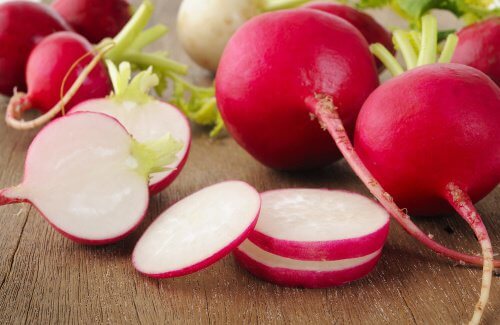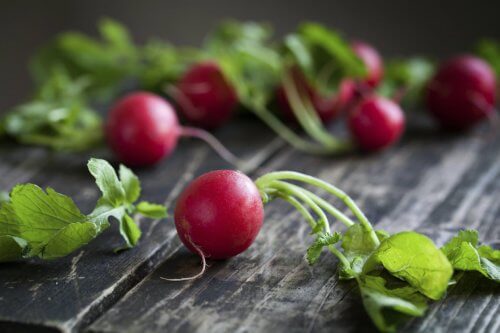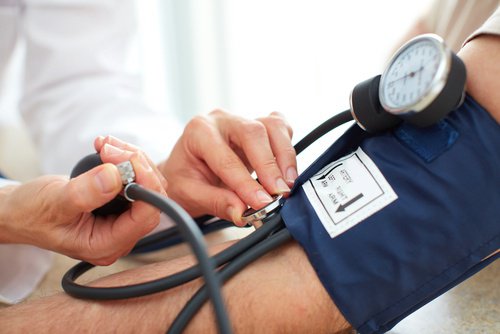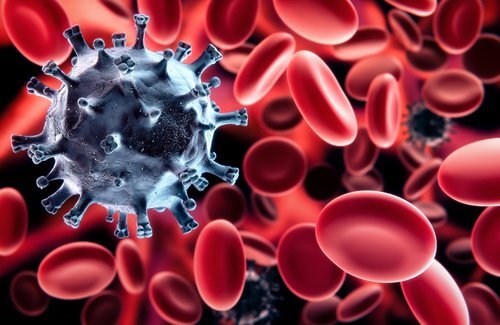7 Reasons Why You Should Eat Radishes


Written and verified by the psychologist Bernardo Peña
They’re small, have an intense flavor, and add a delicious freshness to salads. If you love to eat radishes too, you’re in luck. Why? Your health and body will thank you for it!
There are many types of radishes – white, red, purple, black, and even green (we know that wasabi comes from a kind of spicy radish).
Curiously, even the oil that comes from the radish seeds is very healthy. It’s used for many skin products.
They’re cheap and easy to find at the supermarket. We recommend that you eat fresh, organically grown radishes. Your body will experience positive changes if you eat radishes. We explain their benefits below.
Reasons why you should eat radishes
1. Radishes are good for your liver
Radishes are very good for a healthy liver. They’re detoxifying and rid the blood of toxins and waste.
For example, those who suffer from jaundice benefit from how it can control and reduce their level of bilirubin.
Radishes also protect our red blood cells, improving oxygen flow in your blood.
2. Reduce the risk of urinary tract infections

As we all know, women get urinary tract infections often. But something so simple as adding radishes to salads on a regular basis can reduce your chances of suffering from this condition.
- Radishes are diuretic and naturally increase urine production.
- They’re also very antibacterial, great at fighting infections, and protect the kidneys.
One way to reduce urinary tract infections is to drink this radish-based juice twice a week.
Ingredients
- 2 radishes
- The juice of 1 orange
- 5 strawberries
- 1 glass of water (200 ml)
Preparation
- First, thoroughly wash the radishes and the strawberries. Then, get the orange juice.
- Thoroughly blend the radishes and the strawberries, then add the water and the orange juice.
- This juice has a somewhat spicy and intense flavor.
Discover: Health Properties of Cucumbers
3. Radishes aid weight loss

You should eat radishes if you want to lose weight. They’re low in carbohydrates but very high in fiber, vitamin C, potassium, calcium, and magnesium. Nutrition experts recommend eating radishes because they can stimulate weight loss.
4. Radishes and a healthy heart
Radishes are a large source of anthocyanin, a kind of flavonoid that gives them their color and also contributes to cardiovascular health.
- Anthocyanins have the exceptional ability to protect veins and arteries against hardening as well as inflammation.
- Eating all kinds of red or blue fruits and vegetables provide a good level of this flavonoid.
5. Reduce your blood pressure

This root is a substantial source of potassium. We know this mineral is essential in controlling blood pressure. It also helps improve blood flow. To reap these benefits, try this natural juice.
Ingredients
- 2 radishes
- 2 carrots
- 1 glass of water (200 ml)
Preparation
You already know that the taste of these radish-based juices is a little intense. But they’re definitely worth drinking!
- First, wash the radishes and the carrots thoroughly. Remember that it’s always better to use organic plants, fruits, and vegetables.
- Once clean, blend them to make a juice. Then, just combine with the glass of water.
It’s easy, inexpensive, and has great medicinal benefits!
6. Radishes care for your skin
The vitamin C, phosphorus, zinc, and B vitamins in radishes help care for your skin.
- Radish water also helps maintain a good level of moisture in the dermis.
- Interestingly, some even use raw radishes as a facial cleanser. Don’t forget that the cosmetic industry uses radishes for treating skin problems, given their disinfectant powers.
7. They strengthen your immune system

As you can see, there are many reasons why you should eat radishes. However, one of the more important ones is their ability to strengthen the immune system.
- They’re incredibly rich in vitamin C. This vitamin boosts natural defenses and white blood cells.
- Radishes not only strengthen the immune system but also regulate our metabolism. In addition, they assist collagen synthesis and provide an essential protein that protects against atherosclerosis.
Don’t forget to eat radishes for your health!
All cited sources were thoroughly reviewed by our team to ensure their quality, reliability, currency, and validity. The bibliography of this article was considered reliable and of academic or scientific accuracy.
- Banihani S. A. (2017). Radish (Raphanus sativus) and Diabetes. Nutrients, 9(9), 1014. https://www.ncbi.nlm.nih.gov/pmc/articles/PMC5622774/
- Beevi, S. S., Mangamoori, L. N., Subathra, M., & Edula, J. R. (2010). Hexane extract of Raphanus sativus L. roots inhibits cell proliferation and induces apoptosis in human cancer cells by modulating genes related to apoptotic pathway. Plant foods for human nutrition (Dordrecht, Netherlands), 65(3), 200–209. https://pubmed.ncbi.nlm.nih.gov/20652750/
- Beevi, S. S., Mangamoori, L. N., & Gowda, B. B. (2012). Polyphenolics profile and antioxidant properties of Raphanus sativus L. Natural Product Research, 26(6), 557-563. https://www.tandfonline.com/doi/abs/10.1080/14786419.2010.521884
- Blekkenhorst, L. C., Sim, M., Bondonno, C. P., Bondonno, N. P., Ward, N. C., Prince, R. L., Devine, A., Lewis, J. R., & Hodgson, J. M. (2018). Cardiovascular Health Benefits of Specific Vegetable Types: A Narrative Review. Nutrients, 10(5), 595. https://www.ncbi.nlm.nih.gov/pmc/articles/PMC5986475/
- Castro-Torres, I. G., Naranjo-Rodríguez, E. B., Domínguez-Ortíz, M. Á., Gallegos-Estudillo, J., & Saavedra-Vélez, M. V. (2012). Antilithiasic and hypolipidaemic effects of Raphanus sativus L. var. niger on mice fed with a lithogenic diet. Journal of biomedicine & biotechnology, 2012, 161205. https://www.ncbi.nlm.nih.gov/pmc/articles/PMC3471002/
- Castro‐Torres, I. G., De la O‐Arciniega, M., Gallegos‐Estudillo, J., Naranjo‐Rodríguez, E. B., & Domínguez‐Ortíz, M. Á. (2014). Raphanus sativus L. var niger as a source of phytochemicals for the prevention of cholesterol gallstones. Phytotherapy Research, 28(2), 167-171. https://onlinelibrary.wiley.com/doi/10.1002/ptr.4964
- Gamba, M., Asllanaj, E., Raguindin, P. F., Glisic, M., Franco, O. H., Minder, B., Bussler, W., Metzger, B., Kern, H., Muka, T., (2021). Nutritional and phytochemical characterization of radish (Raphanus sativus): A systematic review. Trends in Food Science & Technology, 113, 205-218. https://www.sciencedirect.com/science/article/pii/S0924224421003058
- Hwang, K. A., Hwang, Y., Hwang, H. J., & Park, N. (2022). Hepatoprotective Effects of Radish (Raphanus sativus L.) on Acetaminophen-Induced Liver Damage via Inhibiting Oxidative Stress and Apoptosis. Nutrients, 14(23), 5082. https://pubmed.ncbi.nlm.nih.gov/36501112/
- Isemura M. (2019). Catechin in Human Health and Disease. Molecules (Basel, Switzerland), 24(3), 528. https://www.ncbi.nlm.nih.gov/pmc/articles/PMC6384718/
- Jadoun, J., Yazbak, A., Rushrush, S., Rudy, A., & Azaizeh, H. (2016). Identification of a New Antibacterial Sulfur Compound from Raphanus sativus Seeds. Evidence-based complementary and alternative medicine : eCAM, 2016, 9271285. https://www.ncbi.nlm.nih.gov/pmc/articles/PMC5066007/
- Kumar A. (2004). Influence of radish consumption on urinary calcium oxalate excretion. Nepal Medical College journal : NMCJ, 6(1), 41–44. https://pubmed.ncbi.nlm.nih.gov/15449653/
- Lee, S. W., Yang, K. M., Kim, J. K., Nam, B. H., Lee, C. M., Jeong, M. H., Seo, S. Y., Kim, G. Y., & Jo, W. S. (2012). Effects of White Radish (Raphanus sativus) Enzyme Extract on Hepatotoxicity. Toxicological research, 28(3), 165–172. https://www.ncbi.nlm.nih.gov/pmc/articles/PMC3834419/
- Lee, K. D., & Shim, S. Y. (2022). Anti-Inflammatory Food in Asthma Prepared from Combination of Raphanus sativus L., Allium hookeri, Acanthopanax sessiliflorum, and Dendropanax morbiferus Extracts via Bioassay-Guided Selection. Foods, 11(13), 1910. https://www.mdpi.com/2304-8158/11/13/1910
- Manivannan, A., Kim, J. H., Kim, D. S., Lee, E. S., & Lee, H. E. (2019). Deciphering the Nutraceutical Potential of Raphanus sativus-A Comprehensive Overview. Nutrients, 11(2), 402. https://www.ncbi.nlm.nih.gov/pmc/articles/PMC6412475/
- Moon, P. D., & Kim, H. M. (2012). Anti-inflammatory effect of phenethyl isothiocyanate, an active ingredient of Raphanus sativus Linne. Food chemistry, 131(4), 1332-1339. https://www.sciencedirect.com/science/article/abs/pii/S030881461101404X
- Oh, M. J., Lee, H. H. L., Lee, H. B., Do, M. H., Park, M., Lee, C. H., & Park, H. Y. (2022). A water soluble extract of radish greens ameliorates high fat diet-induced obesity in mice and inhibits adipogenesis in preadipocytes. Food & function, 13(14), 7494–7506. https://pubmed.ncbi.nlm.nih.gov/35686604/
- Taniguchi, H., Kobayashi-Hattori, K., Tenmyo, C., Kamei, T., Uda, Y., Sugita-Konishi, Y., Oishi, Y., & Takita, T. (2006). Effect of Japanese radish (Raphanus sativus) sprout (Kaiware-daikon) on carbohydrate and lipid metabolisms in normal and streptozotocin-induced diabetic rats. Phytotherapy research : PTR, 20(4), 274–278. https://pubmed.ncbi.nlm.nih.gov/16557609/
- United States Department of Agriculture. (2019). Radishes, raw. FoodData Central. Recuperado de: https://fdc.nal.usda.gov/fdc-app.html#/food-details/169276/nutrients
This text is provided for informational purposes only and does not replace consultation with a professional. If in doubt, consult your specialist.








